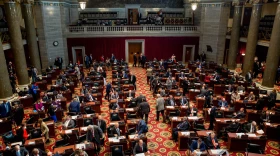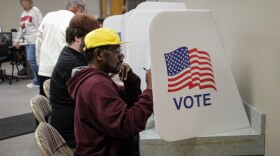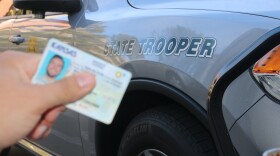Election 2024

2024 is a presidential election year, but it's also a big election year for Kansas and Missouri, where voters will decide races for U.S. Senate, governor and much more.
State primary elections in Missouri and Kansas are on Aug. 6, 2024.
Election Day is on Nov. 5, 2024.
No matter which state you're voting from, KCUR wants to make sure you have all the information you need before you fill out your ballot.
Over the year, we'll be providing guides and resources for the 2024 election — plus interviews with candidates and spotlights on individual races.
All of the content below — and everything on our website — is available for free, always, no paywall or login needed. But if you want to support our journalism, you can become a member of KCUR here.
Voter tips
- Want to know who represents you in the legislature? Look up your representatives in in Kansas and in Missouri.
- Before you head to the polls, make sure you’re registered to vote. Voter registration deadlines have passed in both states, but you should double check your voter status in Missouri and in Kansas.
- Speaking of polling places, here’s where to find your voting location in Missouri and Kansas. Take note: Your polling place may have changed since the last time you voted.
- Both Kansas and Missouri require photo ID to vote, and the accepted forms of identification differ in each state. If you don’t bring proper ID, you’ll have to cast a provisional ballot.
Dates & deadlines
- Missouri voter registration deadline for primary: July 10, 2024
- Kansas voter registration deadline for primary: July 16, 2024
- Advance voting begins in Kansas: July 17, 2024
- Primary election day: Aug. 6, 2024
- Missouri voter registration deadline for general: Oct. 9, 2024
- Kansas voter registration deadline for general: Oct. 15, 2024
- Advance voting begins in Kansas: Oct. 16, 2024
- General election day: Nov. 5, 2024
-
The permanent exhibit at Brown v. Board of Education National Historical Park in Kansas has been flagged because it mentions "equity," the lawsuit says.
-
KCUR's Up To Date featured three Trump supporters in an interview last week, which included statements that could not be verified. The response was swift — and overwhelmingly negative.
-
Three Kansas Citians who voted for Donald Trump in 2024 spoke with KCUR's Up To Date about the first year of his second term. Although Trump's approval numbers have declined overall, in part due to multiple controversies around ICE, supporters say his handling of the southern border and deportations has been “great.”
-
Trump promised to "make America affordable again," but food prices are still rising. Although Kansas City and St. Louis residents enjoy a lower cost of living than many Americans, that's of little comfort when household staples remain unaffordable for many.
-
Former state Sen. Bill Eigel has been criticized for receiving automatic contributions when he ran for governor and again when he launched his current bid for St. Charles County executive.
-
Missouri Secretary of State Denny Hoskins, going against a century of precedent, declared that the Republican-favoring congressional map took effect Dec. 11, even though opponents had submitted enough signatures to likely force a statewide referendum.
-
Some Republican election officials have broken with the president on nationalizing elections, even as they have avoided criticizing him directly. That includes Missouri Secretary of State Denny Hoskins, who also told lawmakers he wouldn’t provide the state’s full voter list to the feds without a court order.
-
Kansas lawmakers say that requiring driver's licenses to list legal status would reduce noncitizen voting — something that is exceedingly rare. One study says suspected cases happen just 0.0001% of the time.
-
A new NPR/PBS News/Marist poll finds a jump in disapproval of the agency among Democrats and independents, but Republicans are standing by ICE and the president.
-
Tariffs are a key component of the Trump administration’s policy to revive the U.S. economy. So far, the strategy of taxing trading partners is not working as promised in Nebraska.











